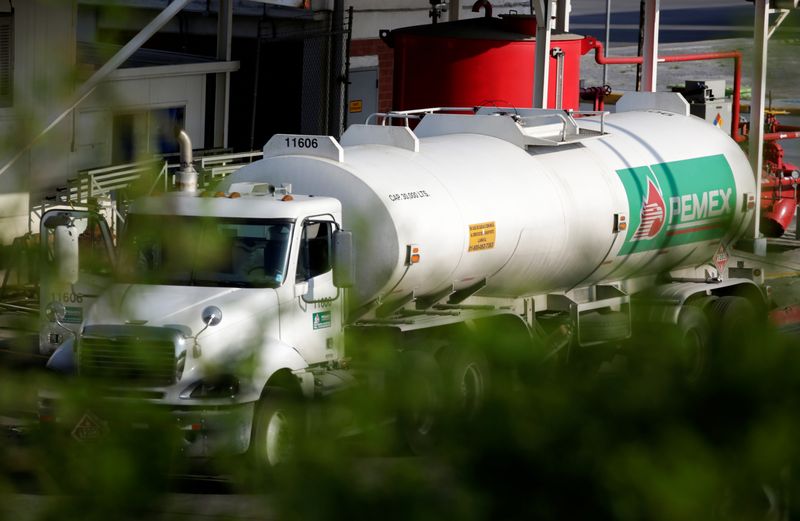By Devika Krishna Kumar and Marianna Parraga
NEW YORK/MEXICO CITY (Reuters) - Pemex's trading arm is overhauling its fuel importing practices, five sources close to the matter said, which includes shifting to swapping crude oil with major partners in exchange for gasoline and other fuels to save cash.
The changes are the latest by President Andres Manuel Lopez Obrador's administration to protect the state oil company's finances and preserve its available credit after it lost $26.4 billion in the first half of the year. The company and its PMI Comercio Internacional trading arm are Latin America's largest gasoline importers.
Several major partners, including Exxon Mobil (N:XOM) and U.S. refiners Valero (N:VLO) and Marathon Petroleum (N:MPC), have progressed in talks for the new arrangements with PMI, according to one source.
Exxon and Marathon declined to comment. Valero and Pemex did not respond to requests for comment.
By switching to swap agreements, rather than buying through spot contracts, the company could pay for about 20 percent of its total fuel imports with deliveries of Mexico's Maya crude.
In the year and a half since Lopez Obrador took office, Pemex increased its reliance on spot purchases for imports in the expectation that the country would be able to increase its refining output and rely less on foreign fuel, sources with direct knowledge said.
In the first half of 2020, Pemex imported a 607,000 barrels per day (bpd) of gasoline and other fuel, and exported 1.14 million bpd of crude, according to company figures.
Pemex's financial debt rose to $107.2 billion at the end of the second quarter, among the most for any oil company. Last year, Pemex changed its formula to price its flagship crudes for export in an effort to cut rising costs associated with the finance ministry's annual oil hedge.
As the debt pile has swelled, the company has lost some of the open credit agreements it had, two sources said. The swap arrangements are meant to boost cash flow and available credit, giving Pemex more financial flexibility every month, one of the sources said.
"Business partners know Mexico will pay, but these new contracts will facilitate invoicing and payments," the source said.
Not all of PMI's purchases will be converted into term deals and fuel purchases from Europe and Asia are not expected to change. For PMI, leaving some exposure to spot deals would ensure access to cheap fuel if prices were to drop.
(GRAPHIC - Pemex fuel imports: https://fingfx.thomsonreuters.com/gfx/ce/rlgvdnjylvo/Pemex%20fuel%20imports.PNG)
PROPOSED AGREEMENTS
Many of the proposed term agreements would cover short time frames. A source at one of the foreign companies in talks with PMI said his firm was offered a deal covering three months of fuel supply.
When oil prices collapsed earlier this year and global fuel demand cratered because of the coronavirus pandemic, Mexico was able to either cancel or postpone scheduled spot deliveries. But swap agreements would make this more challenging, as those agreements generally specify volumes for delivery.

Under term contracts, PMI would have to declare "force majeure" in situations involving extenuating circumstances. That could open up firms to legal disputes and cause logistical headaches for Mexico, which has long grappled with insufficient storage capacity.